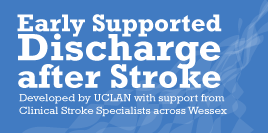 |
Dysarthria |
Recommendations 6.20.2.1
A. Any patient whose speech is unclear or unintelligible following stroke so that communication is limited or unreliable should be assessed by a speech and language therapist to determine the nature and cause of the speech impairment and communication restriction.
B. Any person who has dysarthria following stroke which is sufficiently severe to limit communication should:
- be taught techniques to improve the clarity of their speech
- be assessed for compensatory alternative and augmentative communication techniques (eg letter board, communication aids) if speech remains unintelligible.
C. The communication partners (eg carers, staff) of a person with severe dysarthria following stroke should be taught how to assist the person in their communication.
Sources 6.20.2.2
A. Consensus
B. King and Gallegos-Santillan 1999; Mackenzie and Lowit 2007; Palmer and Enderby 2007
C. King and Gallegos-Santillan 1999
 |